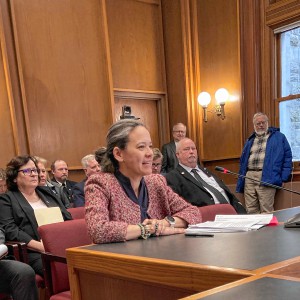Valley News – New NH law to make follow-up breast cancer screenings covered by insurance
January 2, 2025

- Brazil’s new Insurance Law: main direct impacts on reinsurers
- Security First, Embark tie up on homeowners insurance programme
- There’s uncertainty ahead for the health insurance industry in 2025
- Michael Moore Defends ‘Boiling’ Anger For Health Insurance Industry
- You Still Have Time to Enroll in Affordable Care Act Health Insurance
Carrie Becker testifying in the House of Representatives for HB 1296 earlier this year.
Courtesy photograph – Susan G. Komen Foundation
When Carrie Becker received abnormal results back from her yearly mammogram, she underwent a series of tests. Three biopsies, three ultrasounds, three mammograms and one MRI later, she learned what the tests had confirmed: she had breast cancer.
While her initial mammogram was covered by insurance, the 10 diagnostic screenings that followed were not, totaling $3,500 in out-of-pocket costs. Thanks to new legislation going into effect Jan. 1, these diagnostic and supplemental tests will be covered by state insurance carriers, reducing a significant financial barrier to medical care.
“Think about someone who works in a retail job or in the restaurant or service industry. They’re not going to be able to do it. They’re living maybe paycheck to paycheck. It’s a choice: ‘I can either go have this diagnostic test and I can pay for that, or I can cover heat and gas and put food on the table for my kids,’ ” Becker said.
She came to Concord from North Hampton, N.H., to testify for the breast cancer screening bill, HB 1296, in both the House and Senate earlier this year as a survivor advocate for the Susan G. Komen Foundation, a breast cancer nonprofit organization. According to the foundation, in 2023 in New Hampshire, nearly 1,400 people were diagnosed with breast cancer, with 180 dying as a result of the disease. Breast cancer affects both men and women, although women receive diagnoses in much larger numbers. The foundation estimates that 12% of people require follow-up imaging tests after an abnormal mammogram.
“Without the financial assistance, a lot of folks will just simply delay or forego these medically necessary tests, which means the patient won’t seek care until the cancer has spread, making it much deadlier, much more costly to treat,” said Angelica Katz of the Susan G. Komen Foundation.
Twenty-eight states have passed legislation similar to New Hampshire’s, according to Katz. Massachusetts signed a bill into law last month, and Rhode Island intends to reintroduce the bill to its legislature next year.
When Katz approached Rep. Catherine Rombeau, D-Bedford, about crafting the legislation as the bill’s prime sponsor, Rombeau jumped at the opportunity.
“I don’t really know anybody who hasn’t had breast cancer affect their lives in some way by middle age, whether it’s parents or friends,” Rombeau said. “My mom went for treatment for breast cancer a few years ago, so it’s affected my family life, too. I thought this would be an opportunity to work for legislation that would get women access to earlier diagnosis and then earlier treatments. And that seemed like really meaningful legislation to do.”
Mike Rollo of the American Cancer Society explained that money is a commonly known barrier to healthcare in general but specifically for cancer screening.
Xem thêm : Palomar Holdings Inc Acquires First Indemnity of America Insurance Company
“That’s just not right,” Rollo said. “We want to make sure that if someone does have cancer, it’s caught at the earliest possible stage when it’s much easier to treat and people have much better outcomes. But also it’s that uncertainty, not knowing. It’s also not fair to the individual. In some cases, they may not have cancer. In some cases they did. It just went undetected until it got so bad.”
Although doctors caught Becker’s cancer early, the treatment, surgery, and stress she experienced took a toll.
“When you’re going through all this, you’re so numb,” she said. “You don’t have your road map of what’s going to happen.”
For people without the financial resources to pay for the diagnostic supplemental screenings, this bill will make a difference in catching cancer early and, ultimately, saving lives.
“I think there can be a lot of skepticism about what government can get done,” Rombeau said. “I feel like this is a great opportunity for local government, really state level, to make an impact on people’s lives.”
Nguồn: https://propertytax.pics
Danh mục: News
